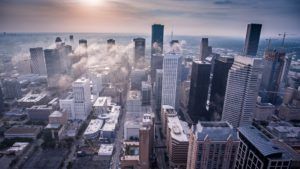It’s been more than a year since we had to retreat for quarantine and, for those fortunate enough who get to work remotely, it has represented the opportunity to explore the benefits and pains of working from home.
But months have gone by. The places we used to go on a daily basis are neglected, and there is a question in the air about those spaces, once vibrant and full of life: Who is taking care of them?
It’s not a secret that Covid -19 crisis has affected almost all industries. We’ve witnessed the abandonment of office buildings, stadiums, malls, restaurants and concert venues. Sadly, many vendors and staff who were in charge of maintaining those places were let go; now the spaces are running with reduced personnel and a good amount of them are starting to have problems related to lack of preventive and periodic maintenance.

The apparent damage is just the tip of the iceberg; the biggest problem is that, during these difficult times, buildings got sick too!
But, how is that possible? Can an inanimate object like a building get sick? Yes, it’s possible and, according to the CDC (Centers of Disease Control and Prevention) is related to:
- Stagnated water in deposits and pipes.
- Mold in A/C systems
- Corrosion of metal surfaces
- Accumulated dust
All the situations mentioned above must be addressed properly, however, the biggest issue is related to water and the decay of building’s plumbing when water systems have low or no use.
In order to prevent water issues, most providers in the U.S treat it with chemical disinfectant, however, the effect is limited and it doesn’t last for more than a few months. For that reason, authorities in America, Canada and some countries in Europe have published recommendations that can be summed up by saying: Keep water fresh

Although there is information about this issue, due to the pandemic, facilities managers and personnel in charge of maintenance have not been able to address the situation properly. A good number of buildings are still managed off-line and most activities are coordinated by one person or reduced teams.

Even in small buildings, it can take up to 2 hours just to flush the water located in pipes, and that is just a tiny part of the work; water deposits must be sanitized to avoid other waterborne infections. Faucets, softeners, refrigerators and other appliances that need water turnover require attention from specialists.
Keeping track of the whole process by hand for facilities managers and building owners is overwhelming, and the answer to face the situation might be in technology. The truth is that digital tools have been with us during these challenging times, they are providing new ways to connect better with each other when we need it the most.
Tools like CMMS (Computerized Maintenance Management System) not only make work easier and more effective, but they also help to keep us safe from diseases caused by contaminated water, polluted A/C systems or even dusty surfaces when we go back.
In a software solution like Sweven, for instance, it can be as easy as:
- Set priorities for all the work orders
- Update checklists and tasks status
- Assign work for technicians and field staff
- Sharing photos or videos of the actual state of ongoing work from a mobile app
- Use data to track vendor’s work and measure their performance
- Get information from IoT sensors (temperature, pressure or humidity) to prevent issues

There’s no need to install anything on a computer anymore, just by accessing an online platform it is possible to get all the tools and information to improve the daily operation of a facility and, ultimately, prevent situations that might jeopardise people’s health.
The important thing for people in charge of buildings is to have knowledge and control of what’s going on in their facilities, be in constant communication with their staff and, above all, find quick/effective solutions to the issues they’re facing.





